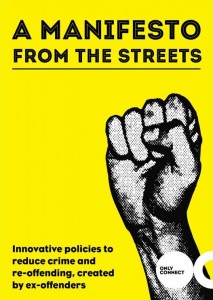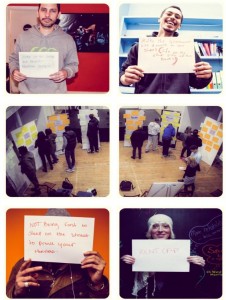
This is a guest blog by one of our talented and hardworking interns, Emmanuel Lee. He’s been instrumental in pulling together our first ever Manifesto.
In the limbo world of graduate job hunting, it’s hard to know what to expect when it comes to internships. But when I joined as a policy & research intern at Only Connect I quickly discovered that being a part of their community meant far more than coffee runs and data entry. On my first day I’d barely had time to adjust the height of my desk chair before my boss, Laura, pulled me into a meeting with some of the senior staff at the charity. I don’t think I contributed anything in that meeting.
In fact, I think I spent most of it pretending to scribble things into my new WHSmith’s notebook as phrases like ‘LASPO’ and ‘Payment-by-results’ were bandied about across the table. It was, however, my first introduction to the Members’ Manifesto, the inspiring project which I have now been working on since.
It’s not unusual for charities to have a set of policies which they support, and whilst they invariably promote good causes, they are usually ideas which are conceived through top-down processes (in the same way political parties produce their manifestos). Only Connect’s Members’ Manifesto challenges this method of politics by bringing it back down to the ground. It aims to produce a set of policies which have been directly crafted by the people to whom the issues really matter. To achieve this we set out to ask OC members which policies they wanted to see raised in anticipation of the upcoming general election. My job was to work with members to develop four policies to include in the manifesto.
And this is typical of how most things work at OC… the entire operation is staff helping members, members helping staff, and members and staff working together to help the community.
Generating the ideas
 Being completely honest, when we started I had no idea how much interest there would be in the project. It seemed like a good idea, but given the disconnect with mainstream politics these days, I wasn’t sure whether people would think the whole thing was pointless. We decided to test the waters and keep things simple at first. We cleared the black boards at our two centres, OC West and OC Central, and asked members to post up any ideas they had about things they wanted to see changed in society.
Being completely honest, when we started I had no idea how much interest there would be in the project. It seemed like a good idea, but given the disconnect with mainstream politics these days, I wasn’t sure whether people would think the whole thing was pointless. We decided to test the waters and keep things simple at first. We cleared the black boards at our two centres, OC West and OC Central, and asked members to post up any ideas they had about things they wanted to see changed in society.
There was no disconnect.
It barely took a day before the black chalk boards were completely covered by a luminous collage of sticky notes (photo). Housing, employment, drugs, transport… the ideas covered pretty much every aspect of society. And they ranged from the ambitiously radical, to the simple yet practical. Given we knew there was definite interest in the project, the next step was to talk to the members and find out about the ideas in more detail. I attended the Men’s Group one Thursday at OC West. The passion for change was palpable, staff members, Ish and Daré, helped lead a discussion which could have been mistaken for an episode PMQs were it not for all the serious debating.
Once we felt there was enough of a buzz, we decided to organise a selection event, which we held on February 11th.
Selecting the ideas.
So we h ad loads of ideas, all written up and posted onto easels around the main hall in OC Central (photo). The next challenge was to sift through all of it and pick out four policies. We started by asking members to write their initials on the four ideas which they liked the most. Slowly patterns began to emerge, as members became more resolute about the policies they wanted to see in the manifesto. After over an hour of discussion and debate, including an impromptu and passionate speech from one of the members on the importance of domestic violence education, we were left with our four ideas.
ad loads of ideas, all written up and posted onto easels around the main hall in OC Central (photo). The next challenge was to sift through all of it and pick out four policies. We started by asking members to write their initials on the four ideas which they liked the most. Slowly patterns began to emerge, as members became more resolute about the policies they wanted to see in the manifesto. After over an hour of discussion and debate, including an impromptu and passionate speech from one of the members on the importance of domestic violence education, we were left with our four ideas.
Throughout the rest of the month, Laura and I thoroughly researched each idea in order to get a clear understanding of what was already in place, and how the ideas could be crafted into proper policy initiatives. They have now been written up and can found in our official Manifesto.
Next comes the tough part: over the coming months we will be launching a dedicated campaign for each of the policies, engaging stakeholders and targeting politicians at every level of society. Alongside this, our members will be exploring each of the issues in more depth, offering first-hand insights through various creative outlets. Expect everything from blogs, music videos, podcasts, interviews, diaries… you name it.
By turning these visions into reality, we’re going to show that a manifesto can be more than a set of false promises.



